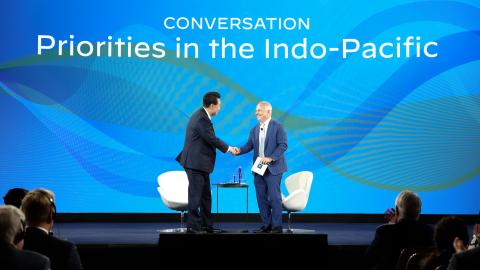The good thing about the presidential debates is that they give us a clear idea of where each candidate wants to take the country. Not in great detail, with every twist and turn on the road to each man's promised land marked off, but in terms of the general direction. Obama wants more government, Romney less or at least no more. Obama wants to base a new tax structure on fairness, Romney on incentives to create jobs. Obama wants to subsidize wind, solar power, and electric vehicles, and restrain the development of oil, gas, and coal resources, while Romney wants to eliminate impediments to the development of fossil fuels, and let renewables look to the market for capital.
Romney wishes, if elected, that he could ditch Ben Bernanke before his term expires at the end of January 2014, and certainly will replace him then with a chairman less eager to print money, while Obama will hunt for a replacement-assuming Bernanke sticks to his plan to combine the serenity of academic life with the material advantages of consulting and board membership-who sees no reason not to add QE4 to the existing fleet. Both want to "create jobs," as if that is within their power, and cut the deficit, or at least Obama says he does.
But debates leave out two things. The first is the ability of the president to pick a venue in which he can say things that can't be challenged on the spot, face-to-face. So he waited until after he and Romney were in different states to announce that he agrees with his hardliners in the Senate, and would rather take the country over the fiscal cliff than give up his demand that the lower Bush tax rates on people earning more than $200,000 per year ($250,000 for families) be allowed to expire. If the president and his Democratic colleagues have their way these "wealthy folks," already facing higher tax rates built into Obamacare, will see their marginal tax rates jump from around the mid-thirty percent range to as high as something like 45 percent (exact computations depend on individual circumstances).
Before dismissing this as blustering by the president, consider this. If Obama returns to 1600 Pennsylvania Avenue, while the Republicans retain control of the House, there is no reason to believe that the scars of the campaign will heal quickly and the contemptuous attitude displayed by the vice president will morph into Ronald Reagan-Tip O'Neill bonhomie and compromise in which each side gives a little. If the Romneys should be measuring the White House for new curtains, there is even less reason to believe that Senate majority leader Harry Reid and his colleague, Chuck Schumer, eager to out-tough his friend Reid so that he can get his job, will approach negotiations with the new president in a spirit of sweet reasonableness. Besides, there is growing sentiment in Washington to take the plunge over the cliff in the hope that the cut in expenses and the rise in taxes will sharply reduce the deficit, the resulting (short) recession being a small price to pay for getting the nation's finances in order.
The second thing debates tend to omit is any discussion of what British prime minister Harold MacMillan once said he feared, "Events, dear boy, events." Neither candidate is willing to admit that policies he is laying out might not survive a brush with reality, the "events" that MacMillan feared. Neither has said what he plans to do when the reality of the economic and political chaos in the eurozone bites-the $1.2 million Nobel Prize awarded to the European Union (setting off a battle among top bureaucrats, each of whom wants to give the acceptance speech), is a pittance compared to the bail-out billions that Greece, Spain, Portugal, and perhaps even France will want from Germany.
Nor has either candidate given a clue as to how he would react if Israel decides that it can no longer trust its survival to America, and takes out Iran's nuclear facilities, with an unpredictable consequence for world oil prices.
In short, it is less what the candidates want to do than what they will in fact to be able to do. So let's make some reasonable assumptions. The world will remain too much with us, or at least the eurozone will, as even a casual scan of television's financial channels demonstrates. Share prices here respond to rumors and data coming from the eurozone, and the most likely set of rumors and data during the early years of a new presidency will be that things are not at all well, that Germany is balking at forking over its hard-earned cash unless the periphery countries surrender to it the sovereignty they have in the not-so-distant past spent blood and treasure to retain, and don't want to sell for a mess of Berlin's euros. Bad news from the eurozone is bad news for U.S. financial markets.
Then there are the real world's reactions to the plans of the candidates. Obama says he is willing to go over the fiscal cliff into recession, although what good that would do for the middle class for which he purports to bleed is unclear, as is the reaction of financial markets to this news of an increase in revenue to the Treasury (lower deficits) and decreased incentives for business investment and therefor slower growth (higher deficits). Obama's proof of his credentials as a genuine class warrior would have a worse effect on the economy than Romney's plan to take an ax to spending. But if Europe's experience is any guide, the Republican candidate would do better to use a scalpel. In Europe, spending cuts are part of what is called "austerity," which is producing a downward spiral of higher deficits, more austerity and taxes, still higher deficits and on until the streets fill with the disgruntled and politicians decide that we are all Keynesians now. At that point the bond vigilantes would saddle up, drive up interest rates on Uncle Sam's IOUs, and make a hash of both candidate's plans. That will be a consequential "event," and also provide a test of whether the governing mechanisms put in place by our Founding Fathers are more supple and responsive to economic crisis than those crafted by the bureaucrats and politicians who created the eurozone. Good for future Ph.D. candidates, not so good for the rest of us.
Add to the mix an Israeli decision to take the small matter of its survival into its own hands, and not depend on the kindness of strangers as it once did, with calamitous results. Whether or not the Iranians succeed in closing the Strait of Hormuz, a large quantity of oil will be withdrawn from world supply in the resulting chaos in Iran, and until that loss can be made up-the Saudis will give it a good try-we can expect that our economy, growing slowly if at all, will feel the impact of higher prices, especially since gasoline prices are starting from a much higher level than existed when prior oil shocks hit, and most consumers' incomes are hardly buoyant.
All in all, campaign promises might mean little, and flexibility and the ability to fashion compromises mean a great deal once reality gets its teeth into the next president of the United States.













